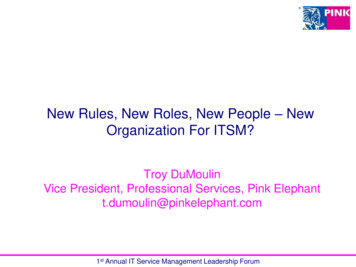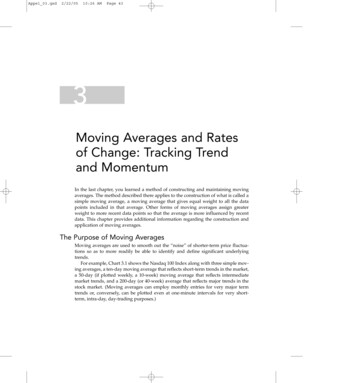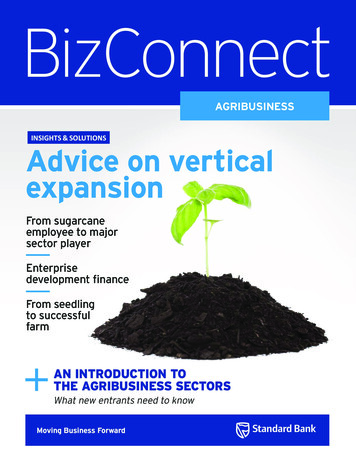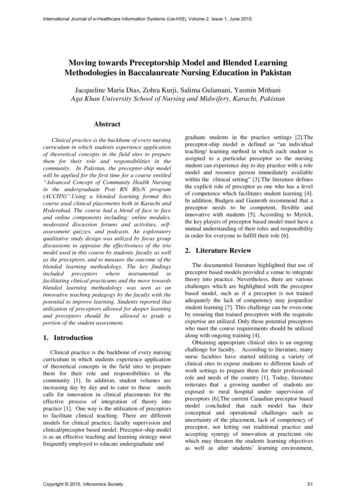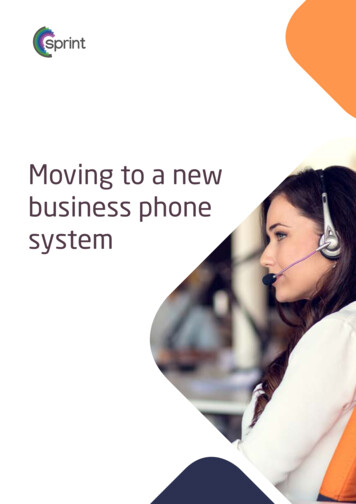
Transcription
Moving to a newbusiness phonesystem
IntroductionPhone systems have been installedin offices of all different sizes formore than 40 years, providing a vitalservice to the business. Since then,telephone call handling has maturedto become intertwined with theday-to-day process of running thebusiness. Practices vary by countryor region, and are predicated on atraditional office culture and userexpectations of how to manage officecommunications between customers,workers and managers.The average business phone systemlasts anywhere between six and eightyears, after which the system is eitherout of maintenance or is lagging infeatures, often to the extent that itis hurting the performance of thebusiness. Businesses that need toupgrade their existing phone systemwill find a huge array of new solutionsavailable compared to seven or eightyears ago.For starters, new software-basedcommunications solutions don’t needdedicated hardware in the serverroom or IT office anymore, becausethe entire system runs in the cloud.In many instances, “hard phones”such as your desk phone are not evenrequired. New phone solutions ofteninclude a “soft phone” or “client” thatruns on many different devices, suchas your PC, tablet or smartphone.And modern phone solutionsno longer offer just “voice”. Theyhave transformed to offer arange of Unified Communications(UC) capabilities such as instantmessaging, presence, video calling,collaboration tools and mobilitysolutions, all designed to keep yourbusiness at maximum productivity.This Whitepaper will provide quickand easy answers to commonquestions that arise when you’relooking for a new business phonesystem.
Ask yourself: What doI need from my nextsystem?It’s easy to simply go out and buya like for like replacement for yourphone system, but doing so wouldmean you are missing a goldenopportunity to bring a range ofpowerful new capabilities into yourbusiness. Before you start looking atdifferent phone system options, thinkcarefully about what you need in yournext phone system.Here are a few questions to thinkabout: Infrastructure Maintenance Missed Calls How many phone calls does yourbusiness miss because the calleither goes to someone who is outof office or all the lines are busy?Disparate Systems Do you have different systemsin different offices resulting infeatures that don’t work the same,causing staff confusion?Or customer calls that cannot beeasily transferred between sites?Is your phone system a vital organin your business, and if it goesdown, so do you?Have you suffered a networkor equipment failure that hasstopped inbound and outboundcalls?Do you worry about having to findelements of the phone systemyourself if something goes wrong?Fluctuating/Fraudulent Expenses Are you worried about unexpectedbills with tiered minutes pricing orhigh International calling costs?When you bought your last phonesystem, do you think you got agood deal - or did you find out a lotof hidden costs after you boughtthe basic system?Do you want to avoid hidden costswith maintenance of the systemthis time around?
Enterprise Usage Do your remote workers struggle with calling people in the business simplybecause they are remote?Do staff struggle with the endless set of buttons on the handset and end updropping customer calls?Do your mobile workers feel detached from the business when they are outof the office?Do your younger generation use their own mobiles so you are never sure ifthey are working or not whilst in the office?Does the phone system really deliver the professional image that you want toportray for your business?If you’ve identified with some or all of these questions, you are not alone. Theyare some of the most common issues we see today in the business world whenit comes to replacing a phone system.Chances are you will need to prioritise these questions into the ones that aremost important for your business. We’ll look at that prioritisation a little later on,but in the meantime let’s focus on what your next phone system can do for you.To make things easier we’ll just stick to cloud based phone systems, as theyare regarded as the best solutions for companies with less than 500 people,especially when they are dispersed over a large number of sites.
How do modern phonesystems help mybusinessIt is easy to get lost in the jargon oftechnology with people espousingacronyms about features that may ormay not make sense to you. So let’stry to narrow down your new phonesystem into some key areas:configurations. In the cloud, you justbuy what you need – no more, noless. If you need more capability inthe future, you just add it. You onlypay for what you use today and addmore users as your business grows.CostDisastersWe’ll start with what is one of yourprimary concerns – costs. Will thisphone system save me money? Mostcloud phone services come with afixed minutes and user plan. You paya certain amount for the user and theminutes come with it. That’s it – endof costs concerns. And many cloudsystems also have very powerfulfraud management capabilities thatwill catch a problem before you areeven aware.We never like to think they happen,but they do. Suppose the electricityboard manages to put their diggerthrough your phone lines - what doyou do? What happens if there is afire or a flood? With a cloud-basedphone system, you can work fromanywhere. Everyone can decampdown to the nearest Starbucks andcontinue working just as normal.Your customers will never know thedifference.FlexibilityThis is linked to costs. Chances arewhen you bought your last phonesystem you ended up over specifyingit because you had to buy it in specific
ConsistencyProfessionalismYou may have added offices overa number of years and inheriteddifferent phone systems that work indifferent ways. With the cloud, all thesystems work the same everywhere.So your offices, mobile workers andremote workers will all have access tothe same powerful range of features.Cloud-based phone systems havea large array of features that untilrecently, were only available on veryexpensive systems used by largeorganisations. Now you can deliver ahighly professional image by havingauto attendants, hunt groups and arange of other call routing features,so that you always look totallyprofessional to your customers.UsabilityCloud systems integrate with yourIT systems so you can simply click tocall out of a web page or directorylisting. Everything is totally intuitiveto the extent that you will probablyforget about pressing phone buttonswithin a few days of getting yournew system. These systems arealso integrated with major cloudbased CRM and customer supportapplications enabling your businessto become more efficient.ProductivityImagine getting a new employeecompletely free. With cloud-basedphone systems, you can implementa range of productivity featuresthat allow your current staff tocommunicate and collaborate muchmore effectively than before, therebyimproving the overall productivityof your business. Features such asroom-based collaboration, conferencecalling and instant messagingcan dramatically improve theproductivity of your business.
MobilityMaintenanceChances are your workforce is gettingincreasingly mobile. You need to bewhere your customer is and so beingmobile is vital. But being mobileshould not mean being disconnectedfrom the business. Yes, people havemobile phones, but do they knowif a person is really in the office ornot? Can they get that vital messagethrough at 5:55 p.m. to win a majornew contract? With cloud-basedphone systems, the mobile workeris always connected to the centralnervous system of your business.They are not remote - they are justmobile.The days of calling the telecomsengineer are well and truly over.Chances are, with a cloud-basedphone system you will never see thatperson again. Phones are easy tomove around with no specialist skillsinvolved. System management is alldone via the web with lots of handyvideos to step you through the morecomplicated tasks. Cloud systemsare designed to make your life easyand just keep running 24/7 so youdon’t have to worry about the costs orwaiting for the telecoms man to comeand find something.
What should I look outfor when I am buying?We have arranged the key features you should look out for by category, in orderto make the selection process easier.Key IssueKey Things to Ask ForCostCheck what is included and not included in the minutesbundle. Are there any exit clauses in the service contract?Do you have to rent the phones for longer than theservice contract?FlexibilityCan you add or remove users during the service contract?Do you have to pay for devices or for users?DisastersCan the system divert calls to tablets or mobile phoneswhen the access network is down? Are there restrictionsin the features when people are remote?ConsistencyAre all the features available to remote workers or dosome get removed? Is the quality the same – for example,some mobile systems only use a technology called VoIPwhen remote, which can hurt voice quality if the networkis congested.
Key IssueKey Things to Ask ForUsabilityAre the features the same on the phone, PC andmobile devices or are they different? Do you stillhave to rely on a telephone?ProfessionalismDoes the system support features such as autoattendant, music on hold, automatic call distribution,call queuing, so you never miss a call.ProductivityDoes the system have features like conferencing,room based collaboration and instant messagingand presence?MobilityDoes the system support iOS and Android devices?Can it support all the productivity features abovewhen mobile.MaintenanceDoes the system have web-based user selfadministration and allow you to control powerfulfeatures from a single web page? Does the servicesupport diagnostics so the service provider canquickly identify any issues that you may run into?
Which cloud phonesystem should Ichoose?There are many different types of cloud phone systems to choose from, butit pays to really understand the underlying technology – or platform – behindyour service provider. The platform determines the provider’s ability to innovaterapidly and drive the biggest impact for your business.Some phone system providers base their service on freeware code that hasbeen available for many years on the Internet. It’s great for them because itis low-cost to develop and allows them to start their businesses up quickly.Unfortunately many of these freeware-based services have issues with quality,and more worryingly security that ultimately could cost youdearly with a fraud attack.By contrast there are some highly industrialised platforms out in the markettoday developed by specialised vendors. They deliver superior features andfunctionality, reliability and a proven track record.
ConclusionBuying the correct phone system has the potential to make a huge differenceto the success of your business in the next 5-10 years. Choosing the rightsystem could mean hiring less staff winning more contracts, worrying less aboutdisasters and yes, saving you money.If you’ve outgrown your current business phone system, take the time to gothrough the questions we’ve outlined above, and write out your top needs andrequirements before contacting your local service provider.And last not but not least, be sure to ask about the underlying technologies thatthe service provider has in place. The fanciest features or the lowest price won’tdo you much good if the quality, reliability and security are not core componentsof the service provider’s platform upon which your services are offering.Horizon hosted telephony from Gamma combines handsets from severalmanufacturers, an easy-to-use web interface, Gamma’s trademarknetwork resilience and services, and the power of the world’s leadingcall controller platform from Broadsoft. Horizon is available as a fullymanaged service.
Modernise yourphone system today!thesprintgroup.com
phone system, but doing so would mean you are missing a golden opportunity to bring a range of powerful new capabilities into your business. Before you start looking at different phone system options, think carefully about what you need in your next phone system. Here are a few questions to think about:
